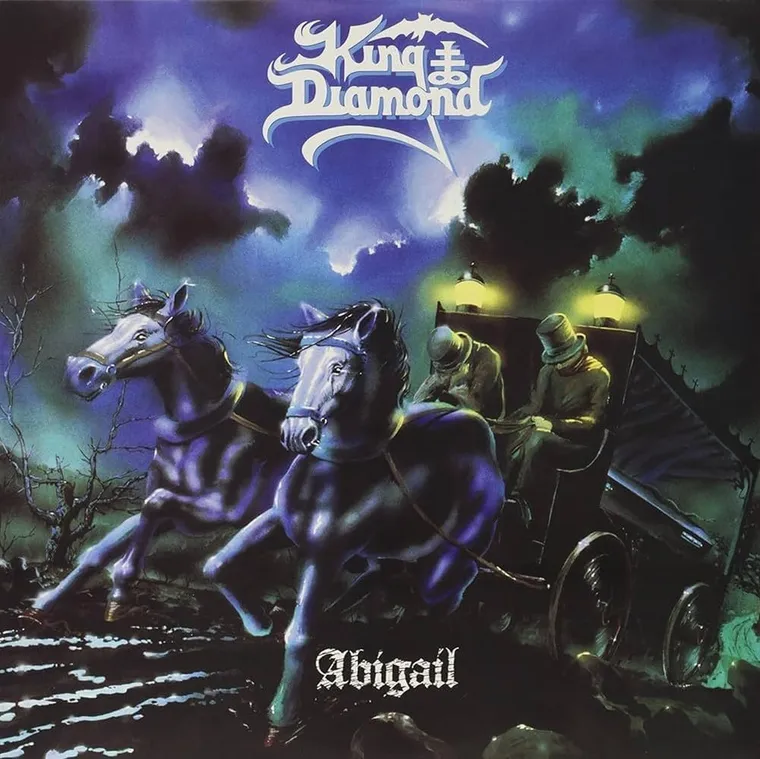Released on October 21, 1987, King Diamond’s Abigail didn’t just tell a story — it resurrected one. This wasn’t just a metal album. It was a haunted novel with guitars for punctuation, where every track turned a page and every riff deepened the dread.
At a time when metal was pushing boundaries sonically but rarely narratively, Abigail dared to do both. It didn’t just deliver horror — it immersed you in it. With gothic ambition and razor-sharp execution, King Diamond didn’t just break away from Mercyful Fate’s shadow — he lit a candelabra and walked boldly into his own twisted world.
If most concept albums flirted with storytelling, Abigail married it, murdered it, and buried it under the floorboards of a haunted mansion.
From Fate to Phantom: A Solo Vision Fully Realized
King Diamond’s leap from Mercyful Fate to a solo career was risky — but Abigail proved it wasn’t just a side step, it was a transformation. The album didn’t rely on shock value or evil posturing. Instead, it built tension like a classic horror film. You could almost smell the damp wood and hear the creaking floorboards of the mansion where its story unfolds.
Set in 1845, the album follows a doomed couple, Jonathan and Miriam, who inherit a cursed estate only to fall victim to the vengeful spirit of Abigail — an undead child born from betrayal and buried alive. It’s gothic melodrama done with absolute conviction, and the storytelling holds up decades later.
But what makes Abigail stand out isn’t just the tale — it’s how tightly it’s woven into the music. Every riff, every tempo shift, every vocal shriek feels like it’s in service of the narrative. This wasn’t King Diamond throwing a story on top of a metal album. This was the story — and the music followed its lead.
Hooks, Horror, and Harmony: What Abigail Sounds Like
The album opens with “Funeral,” a chilling instrumental that feels like the overture to something unspeakable. Then “Arrival” kicks down the doors with a galloping riff and King’s signature falsetto — not as a gimmick, but as a theatrical tool. He doesn’t just sing the characters — he becomes them.
From there, it’s a masterclass in pacing and precision. “A Mansion in Darkness” blends melody with menace, while “The Family Ghost” is pure haunting grandeur, with Andy LaRocque’s lead work cutting like a scalpel through mist.
“LaRocque and Michael Denner’s guitar interplay is surgical — not in a clinical sense, but in how each harmony and solo adds emotional weight. These aren’t just fast passages — they mean something. “The 7th Day of July 1777” is as much a plot twist as it is a song, while “Omens” and “The Possession” lean into atmosphere, slowing things down without sacrificing intensity.
The final act — “Abigail” and “Black Horsemen” — is nothing short of cinematic. The climax is devastating, both musically and narratively. The last track in particular feels like a curtain call, with a melody that sticks like cold breath on a mirror.
Theater Without the Cheese: Emotion Beneath the Paint
What makes Abigail truly work — and why it still resonates nearly 40 years later — is that it never tips into parody. Yes, it’s theatrical. Yes, King Diamond sings in five voices and screams like a ghost trapped in a cathedral. But none of it feels like a joke.
There’s real tragedy here. Real fear. Real pathos. When Miriam’s fate is revealed and Abigail returns to the crypt, you don’t just hear it — you feel it. Behind all the corpse paint and candles is a performer who understands drama not as a gimmick, but as a vessel for emotion.
Even if you stripped away the lyrics and vocals, the music would still carry the weight of the story. That’s a rare thing — and one few concept albums before or since have managed to pull off.
The Production: Atmospheric Yet Aggressive
Produced by King Diamond and Roberto Falcao, Abigail hits a sweet spot that many ‘80s metal albums missed. It’s clean without being sterile, atmospheric without being muddy. The drums snap, the guitars cut, and the keyboards — sparse but well-placed — add tension rather than bloat.
The vocals sit perfectly in the mix, never buried, never overwhelming. Whether he’s whispering, wailing, or narrating, King’s voice remains the centerpiece — and the production lets it shine without overpowering the instruments behind him.
It’s the kind of sound that rewards headphone listening — the layers are all there, just waiting to be uncovered.
The Legacy: The Blueprint for Conceptual Metal
Let’s be clear — without Abigail, there’s no Crimson Idol, no Operation: Mindcrime, no Theater of Salvation. This was the album that showed metal could be as narratively rich as a novel without sacrificing intensity or credibility.
It didn’t sell out. It didn’t soften. It took heavy metal’s darkest tendencies and molded them into something artful, theatrical, and — most importantly — timeless.
While Abigail might not be King Diamond’s most extreme or complex record, it is undeniably his most iconic. It’s the one that still converts new fans. The one that keeps getting rediscovered. The one that haunts, long after the final note fades.
Final Verdict: 10 / 10
Abigail isn’t just a classic — it’s a cornerstone. A perfect storm of concept, performance, and execution. It’s gothic metal as it was meant to be: haunting, heavy, and deeply human beneath the horror.
It doesn’t pander. It doesn’t drag. It builds a world, sets it on fire, and lets you watch the ashes fall.
Even decades later, Abigail remains King Diamond’s crown jewel — an album that didn’t just tell a story, but became one. And like all the best ghost stories, it lingers.

